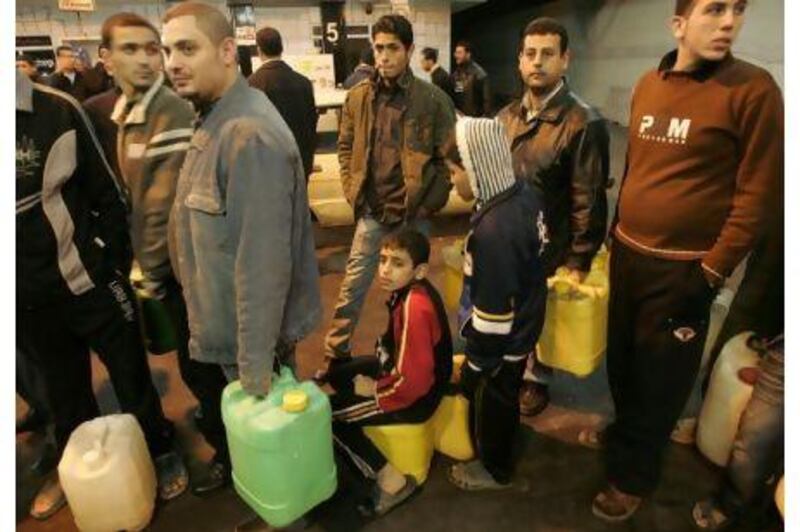GAZA CITY // Sitting behind the counter in his convenience store stocked with Egyptian and Israeli goods, Emad Shawa leans close to the radio to not miss any of the news from Cairo.
Like many residents of Hamas-ruled Gaza, Mr Shawa is closely following the unfolding drama in Egypt, believing any change in the government there would be positive because of restrictions imposed by President Hosni Mubarak on their blockaded territory. Gaza and Egypt share a 15-kilometre border in the southern Rafah area. Hundreds of smuggling tunnels beneath the border serve as a main supply line for Gazans.
"Rafah, it's going to be open," predicted Mr Shawa. "If a new regime opens it by itself, or a regime refuses - it will be open anyway, because the people's will is stronger."
Egypt and Israel severely limited access to Gaza after Hamas took over the crowded coastal strip of 1.5 million people from the western-backed Palestinian Authority president, Mahmoud Abbas, in 2007.
Few here speak kindly of Mr Mubarak, who took power after the assassination of Anwar Sadat, the first Arab leader to sign a peace agreement with Israel. Mr Mubabark's regime has continued to work closely with the Jewish state and severely restricts Palestinians' movements across the heavily guarded border.
"The siege from the Israeli side was expected, we lived it for years, but when it came from a neighbouring Arab country, our brothers and sisters, it was more difficult mentally," added Mr Shawa."We don't blame the Egyptian people. We blame the government."
Since the Egyptian unrest started on Friday, few people or goods have entered from the country. The passenger crossing between Gaza and Egypt, which partially reopened several months ago as part of a slight easing of the blockade, was closed on Sunday by Egypt until further notice.
"I came here at four o'clock in the morning," said one woman waiting at the border with a permit to cross. She was trying to reach her home in Libya after visiting her family here. "They haven't said anything to us."
Others were trying to reach Jordan and the United Arab Emirates via the Cairo International Airport, but at around 9.30am on Sunday, a Palestinian official announced no one would be crossing that day.
The Hamas government is unwilling to open the gates without Egyptian permission and it remains unclear who is manning the Egyptian side of the border. Hamas - originally an offshoot of Egypt's banned Muslim Brotherhood opposition group - is now in a tricky position after years of a hot-and-cold relationship with the Egyptian regime.
In January of 2008, Hamas blasted a massive hole in the border wall and thousands of Palestinians flooded into Egypt to grab food and goods. For now, Hamas is treading lightly and declining to make official comments on the events unfolding in Egypt. They may fear backlash from Mr Mubarak's regime should it manage to survive the continued protests.
Smugglers also say the flow of fuel, cigarettes, cement and other items deemed contraband by Israel through the tunnels under Rafah has been disrupted in recent days. Gazans have begun hoarding fuel, longer lines of motorists were seen at gas stations, and prices have started to rise.
Mr Shawa sells a customer two packs of cigarettes for 15 shekels (Dh15) each. On Friday they cost 12 shekels.
Still, there is widespread optimism that an upheaval in Egypt could lead to better days in Gaza. From the creation of Israel in 1948 until the 1967 war, Gaza was under Egyptian administration and Gazans moved freely in Egypt. Many here remember fondly studying at Cairo's universities and working in the country.
"Some hope this situation might come back again," said Hani al Basboos, an assistant professor of political science as Gaza's Islamic University. "They hope people in Egypt will look after the Gaza Strip. It will affect us badly for a short time … but Gazans are supporting the Egyptian people."
Like many other Gazans, Khaled Nasser, 29, was excited about the prospect of more freedom of movement. "Old women used to say, 'If you see clouds in the sky of Egypt, rain is expected in Gaza.' The good news is coming," he said, leaning against his taxi in the Bureij refugee camp and also listening to the news from Egypt on the radio.
In contrast, in the West Bank, where Hamas's rival Mr Abbas heads a self-ruled government, officials are watching the turmoil in Egypt with concern.
Mr Abbas stands to lose his main Arab patron if Mr Mubarak is weakened or pushed aside. Since becoming president in 2005, Mr Abbas has sought Mr Mubarak's backing for any major decision involving negotiations with Israel and is a frequent visitor in Cairo. Mr Abbas has also relied on Egypt as a go-between with Hamas.
Mr Abbas has avoided taking sides in public, only saying on Saturday that he is eager to see Egypt secure and stable.
[ foreign.desk@thenational.ae ]
* with additional reporting by Associated Press





